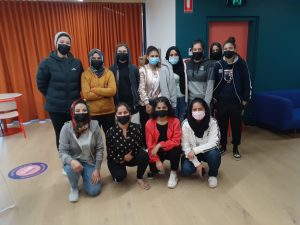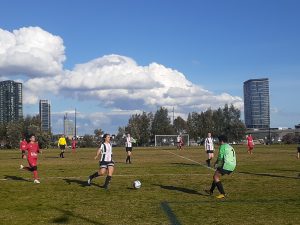Soccer team, a voice for Afghan women
Ron Barassi Reserve is a small community ground in Melbourne’s Docklands.
Flanked by the Bolte Bridge and North Wharf, it is the unlikely home ground of the Afghan national women’s soccer team.
Since fleeing the fleeing the Taliban’s takeover in Afghanistan, the team has found refuge in Melbourne and are now competing under the banner of the Melbourne Victory club in the women’s State League 4.
As the 12 month anniversary of the Taliban’s takeover rolled around, the team, known as the Afghan Women’s Team (AWT), sat third on the table and in their last game of the season they beat Brimbank 9-0.
But rather than focusing on the end of their end of season success, the women’s thoughts have drifted to home.
“Things are not good in Afghanistan at the moment. The situation is worse, not better than when we left – especially for women,” says Fatima Yousufi, the team’s captain.
Since the Taliban took control, despite assurances to the contrary, women’s rights in Afghanistan earned painfully over 20 years have been wound back.
 Rules have been imposed that prevent women and girls from some fundamental rights, including to expression, movement and education.
Rules have been imposed that prevent women and girls from some fundamental rights, including to expression, movement and education.
This has affected women’s access livelihoods, health care as well as basic necessities such as food and water.
The Taliban has prevented women from traveling or going to their workplace without a male family member accompanying them – an impossible requirement for almost all families – and barred them from many jobs. Girls have also been banned from secondary schools.
But the AWT sees itself as a beacon of hope for Afghan women.
“Our team is a voice for the women of Afghanistan,” Fatima says.
“It is the one thing we can do. We can stand up and say that the women of Afghanistan matter and deserve rights such as education, the right to work and build a career,” she said.
Since arriving Australia the team has become even more close-knit.
“We look after each other. We are supporting each other through our sport and our studies and even in getting work,” Fatima said.
Some of the young woman are studying at school or TAFE or university and some have begun working.
“We are all doing well and we are grateful to be in Australia, but we worry about our family and friends at home in Afghanistan,” Fatima said.
In August 2021, the Afghan women’s soccer team should have been competing in Asian Cup qualifiers taking on other national teams from Central Asia and the Middle East.
Instead, they have fled their country and sought safety across the world as part of the coalition nations’ evacuation of vulnerable people out of Kabul in late August as militant Taliban fighters took control of the city.
The sportswomen feared for their lives and their futures under the Taliban.
Fatima said the team’s dramatic exit from Kabul came amid bombings, gunfire and human stampedes; and also of the heartbreak of leaving family members and teammates behind to face an uncertain future.
“The week the Taliban took over in Afghanistan we were very worried. We were scared the Taliban would target us because we were women athletes,” Fatima said.
“We heard news they were taking away women athletes, arresting some players and that some other players had been kidnapped or killed in remote provinces,” she said.
 Fatima said she and her teammates were supported through their ordeal by Khalida Popal, a former Afghan women’s team captain and founder of the Denmark-based women’s rights NGO ‘Girl Power’.
Fatima said she and her teammates were supported through their ordeal by Khalida Popal, a former Afghan women’s team captain and founder of the Denmark-based women’s rights NGO ‘Girl Power’.
“Khalida sent us a message to get together a backpack with our basic necessities and a mobile phone and power bank. She told us not to take any documents which the Taliban could use to identify us,” she said.
“We spent that night the Taliban came awake, talking and watching the bad news unfold on social media. All night we were hoping someone would come and help us.
“When we decided we had to try to get to the airport, our families were supportive. They were happy for us to go telling us that we were in danger.
“But we were all worried, in turn, about our families. There were still documents that could identify us and put in danger our families who would be left behind in Afghanistan,” Fatima said.
She said that the team had become well known in Afghanistan through social media and publicity around the matches they had played in five major tournaments staged since 2019 – the last being against Tajikistan at the CAFA Tournament in June.
Fatima said that finally, they got a message from Khalida to take their backpacks and go to the airport. Khalida had organised visas for the group with coalition nations.
“We set off for the airport, most of us with family members who we were hoping would be able to come with us. It was very scary, there were guns firing in the air and lots of people outside the airport,” she said.
“We went to different gates and we had to go through Taliban checkpoints. It was really dangerous.”
 Fatima and teammates were separated in the crowd as they tried desperately to get into Kabul’s international airport – at the time, the last bastion of coalition forces in Afghanistan.
Fatima and teammates were separated in the crowd as they tried desperately to get into Kabul’s international airport – at the time, the last bastion of coalition forces in Afghanistan.
“It was very difficult for us. We went to each gate to try to get in but at each gate none of the soldiers knew who we were. We had been outside the airport for 24 hours and no one had come to help us. We started to lose hope,” she said.
Finally after 48 hours looking for a way in the team got a crucial and ultimately life-saving message from Khalida to ‘go to the south gate’. Most of the team were able to get into the airport and on flights to safety.












